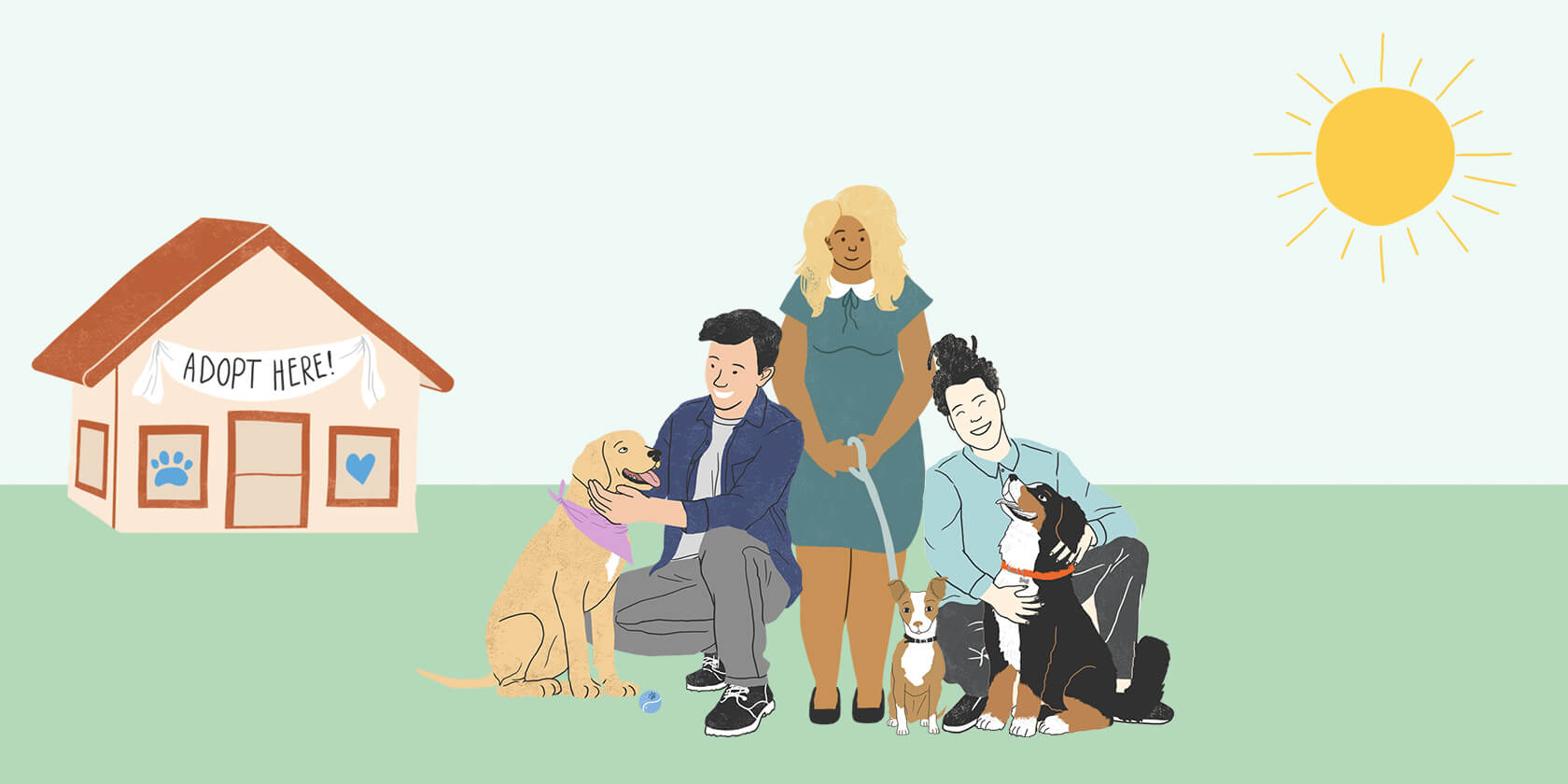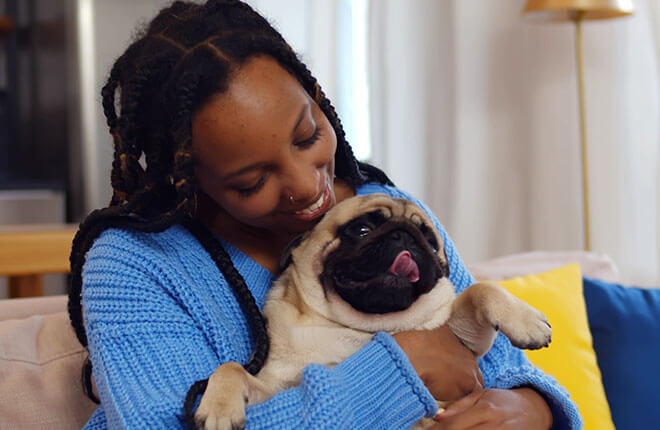If you're about to become a first-time dog owner, selecting a breed that fits your lifestyle is the first step towards a lasting relationship. People decide to add a dog to their lives for a variety of reasons: companionship, to have an exercise buddy, a sense of security, help with a disability, and more. We’ll take a look at what you should consider when getting a dog for the first time and what characteristics make good dogs for first-time owners.
One thing to keep in mind is that while you might be drawn to a particular breed or breed mix for a number of reasons, a dog’s breed isn’t everything. Every dog is an individual, no matter their breed, so it’s also important to consider a particular dog’s history and personality. And while there are plenty of options for pure breed dogs, consider adopting a dog from a shelter or rescue organization – there are many pups in need of a loving home and chances are you can find one that is your ideal breed or breed mix!

Lifestyle and Energy Level
Taking into account your lifestyle and day-to-day activities is essential when considering what breed of dog to add to your home.
- Avid hikers and lovers of outdoor activities. You'll want to look for a dog whose breed and size match best with these activities. Many working or sporting breeds can keep up with lots of physical activity once they are full-grown, such as Labrador Retrievers, Australian Shepherds, Boxers, or medium to large athletic mixed breeds.
- Relaxing, mellow lifestyle. Aim for a dog breed that has an "off switch." While every dog needs physical exercise, breeds such as Pugs, Basset Hounds, Shih Tzus, Cavalier King Charles Spaniels, and even Greyhounds tend to be couch potatoes.
- In-between super-active and sedentary. Breeds such as Cardigan Welsh Corgis, Boston Terriers, Bloodhounds, and French Bulldogs can easily bridge the gap. These breeds are likely to have what dog trainers call "medium drive," meaning they are up for adventure but just as happy to cuddle on the couch.
Also, think about the amount of time you'll be home with your new dog.
- If you spend a lot of time at home. Breeds such as French Bulldogs or Cavalier King Charles Spaniels are often described as “Velcro dogs” and thrive in a home where their owner is around most of the time.
- Long work hours and time away from home. Consider an easygoing and slightly-more-independent breed, such as a Greyhound.
But remember, all dogs need social interaction with their family and do better if not left alone for extended periods.
Climate and Setting
Consider your area and usual weather when choosing a breed.
- Hot climate. Look for breeds with fur types suited for the heat — such as single-coat breeds like Poodles, Whippets, and Terriers.
- Cooler climate. Dog breeds with thick or dark fur, such as Bernese Mountain Dogs and Newfoundlands tend to overheat more easily and enjoy cooler areas much more.
- City-dweller. Sociable dog breeds like French Bulldogs, Boston Terriers, and Golden Retrievers tend to do better with all the hustle and bustle.
- Country life. Many dogs do well in the country. Some breeds tend to be more independent and are more likely to wander off, such as Huskies, Beagles, and hounds, making training more difficult for first-time dog owners.
Suitable for Homes with Children or Other Pets
If you have children, look for a family-friendly dog breed that is predisposed to enjoy being around children and all the activity, movement, and noise that's included. Medium to large breeds can usually handle physical play with children, such as Labrador Retrievers, Golden Retrievers, or Great Danes. If you have young children, consider that larger breeds might inadvertently knock the kids over in excitement. There are smaller-yet-sturdy kid-friendly dog breeds as well, such as Beagles and Pugs.
Grooming Care
How much brushing and vacuuming are you ready for? Your new dog's required grooming care is important!
- Simple maintenance. If you know that you won't have the time or energy for constant upkeep of your dog's fur, look for a dog with minimal grooming needs, such as a Pug, Labrador Retriever, or Greyhound.
- Considerable maintenance. If you love the look of a dog with a long and luscious coat, like a Golden Retriever or Havanese, be prepared for the daily brushing and regular grooming appointments needed to keep them healthy and mat-free.
- Try a shortcut. You can also choose to keep your dog's coat trimmed short, as many Poodle and Havanese owners do. Just be aware that this requires frequent and often costly grooming appointments and doesn't mean you can skip regular at-home brushing.
Health and Medical Care
Every dog requires routine veterinary care, such as yearly wellness exams (or twice-yearly exams for senior dogs), regular vaccinations, and year-round preventative medication for fleas, ticks, and heartworm.
Unfortunately, some dog breeds are more likely to have genetic medical conditions than others. In some cases, their conformation (the structure of their body) can contribute to those medical issues.
- Skeletal issues. Certain breeds are more prone to orthopedic conditions. One example is hip dysplasia, a condition in which the hip joint is more loose than it should be and can lead to painful osteoarthritis (OA). These conditions are most often seen in larger breeds, such as Labrador Retrievers, but can also happen in smaller breeds.
- Respiratory issues. Dogs with flat faces – called brachycephalic breeds – such as Pugs, Shih Tzus, and French Bulldogs have a higher risk of breathing issues. If you decide to get a flat-faced dog breed, be aware that they will need extra caution and care during hot weather and their exercise must be monitored to watch for exhaustion or heat stroke. They'll also need extra grooming care to keep their face clean.
- Allergies. While any dog can develop allergies, some breeds are more likely to suffer from allergies or skin issues, such as Golden Retrievers, Boxers, and West Highland White Terriers. In some cases, this requires more frequent bathing, special diets, and medications to manage itch.
If you've narrowed down a breed or breed mix for your first dog, check into any health issues they might be more prone to inherit and ask your veterinarian for their perspective. In many cases, breed-specific health issues that are anticipated or identified early can be managed with the help of your veterinarian.
Many dog breeds and mixes can be loving companions for first-time dog owners. Owning a dog and developing a strong bond can be rewarding for both owner and dog and lead to years of happiness together.
ZPC-01148R1



